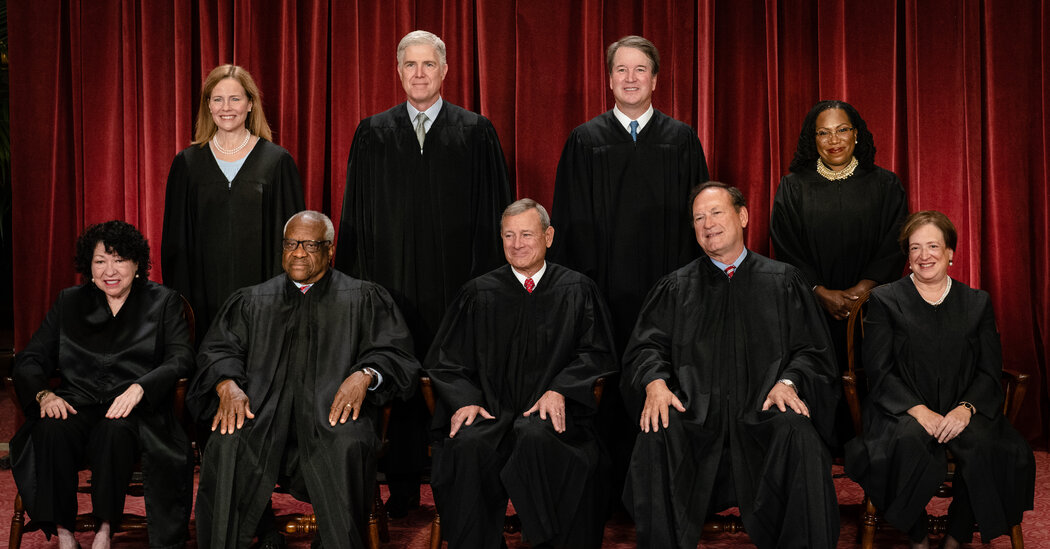The Supreme Court heard arguments for nearly four hours on Monday on a pair of First Amendment cases challenging laws in Florida and Texas that seek to limit the ability of internet companies to moderate content on their platforms. Here are some takeaways:
The cases could shape the future of internet discourse.
As the public square has moved online in the 21st century and technology companies like Facebook, YouTube and X have grappled with objectionable content, new dilemmas have arisen over the scope and meaning of free speech.
Florida and Texas enacted laws limiting the ability of large internet companies to curate what appears on their platforms, in part in response to what some conservatives considered censorship of right-wing views by Silicon Valley in the name of combating hate speech and misinformation. One of the most notable examples: The decisions of some platforms to bar President Donald J. Trump after he repeatedly posted on social media to falsely claim that his loss in the 2020 election was the result of fraud, leading to the Jan. 6, 2021, Capitol riot.
An association of technology companies called NetChoice sued, arguing that platforms have a right to moderate content on their sites — a practice that it said was crucial to keeping them attractive to users and advertisers. The coalition won preliminary injunctions blocking both states from enforcing the laws while broader First Amendment issues are litigated.
The court might send the cases back down.
Both liberal and conservative justices signaled that they would prefer to have a more developed record about how the law would operate, raising the possibility that the Supreme Court could return the case to lower courts for more fact finding.
Justice Samuel A. Alito Jr., a conservative, pointed out that there were no lists of which platforms were covered by the Florida statute or of all the functions those services perform. He raised the possibility of sending the case back down for more discussion at lower-court levels on issues like whether and how the law applies to other tech services, such as direct messages and email. Justice Sonia Sotomayor, a liberal, indicated that she was inclined to do the same.
Both sides claim the mantle of free speech.
Solicitors general for Florida and Texas defended their states’ laws and argued that big internet companies operating social media platforms that are essentially public forums should not be allowed to discriminate based on political views. They portrayed content moderation as censorship.
Paul Clement, a lawyer for NetChoice, argued that “censorship” was the wrong word when it is not the government acting and that the companies were instead exercising “editorial judgment.” He contended that it was unconstitutional under the First Amendment to compel the companies to publish views against their wills.
Is social media like a newspaper? A telephone?
The discussion repeatedly harked back to precedents involving older technologies as a starting point for how to think about the platforms. Henry Whitaker, the Florida solicitor general, argued that social media platforms should be seen as “common carriers” like phone companies because they transmit the communications of their subscribers — so they should not be permitted to discriminate among users based on their views. But Mr. Clement argued that they are like newspapers, citing a 1974 case that struck down a Florida law requiring papers to offer equal space to political candidates who wanted to respond to editorials or endorsements.
The sweep of the laws, especially Florida’s, is a complication.
Several justices expressed discomfort at the fact that the case arrived at the Supreme Court as a so-called facial challenge, meaning the plaintiffs said the law is unconstitutional in the abstract and should be struck down in its entirety. A different way of challenging a law is to say it is unconstitutional as applied to particular categories of activity, while otherwise leaving it in place.
Both liberal and conservative justices suggested that Florida’s law, which is more broadly written than the Texas law, would seem to have more wide-ranging applications that do not qualify as what is known as expressive conduct and therefore fall outside the First Amendment’s protection of free speech. For instance, they suggested the Florida law would also seem to regulate companies like Uber or Etsy that do not publish content.
A ruling could come later this spring.
Although the Supreme Court sometimes moves quickly, it is likely to take more time in this instance. The specific question before the justices is whether to lift preliminary injunctions by lower courts that have blocked Florida and Texas from enforcing their laws as the First Amendment challenges are litigated.
But the line between that procedural question and the merits is blurry: The standard for evaluating such an injunction includes assessing whether the party seeking it — here, the technology companies — is likely to prevail. As a result, what the Supreme Court says about the injunction could heavily influence the outcome of the overall litigation.




